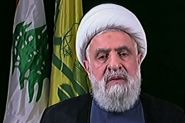
The United States has now placed the responsibility for achieving a ceasefire in southern Lebanon on Parliament Speaker Nabih Berri. This shift was made clear during the phone call between US Secretary of State Antony Blinken and Berri, as well as statements by Senior Advisor to the US President, Amos Hochstein, to Lebanese media, and in his discussions with Caretaker Prime Minister Najib Mikati.
Sources in Washington suggest that the American administration aims to clarify Hezbollah's true intentions regarding the implementation of Resolution 1701. There are concerns that recent actions could be part of a maneuver by Parliament Speaker Berri, aiming to secure a ceasefire with formal agreements that would enable Hezbollah to restore the status quo that existed before October 8, 2023.
Moreover, the US has expressed doubts about Lebanon’s commitment to implementing this resolution. As a result, it is seeking to increase pressure and expedite indirect negotiations with the Islamic Republic of Iran, aiming to reach an agreement that addresses Israel’s response to Iran and secures a ceasefire while implementing Resolution 1701. Despite ongoing talks, no decisive outcome has yet been reached.
According to these sources, Washington is questioning the strategy of Nabih Berri and Caretaker Prime Minister Najib Mikati, who seem to advocate adherence to Resolution 1701, despite the lack of any statements from Hezbollah officials regarding its implementation. Instead, Hezbollah has focused solely on demanding a ceasefire, leaving other issues for later discussion. The US recognizes that with Hezbollah, “later” often means a return to the previous status quo. Once the conflict ends, the group is expected to revert to its defense strategy, operating independently of the state across all Lebanese territories.
These sources emphasize that the implementation of Resolution 1701 requires a complete absence of arms and militant groups south of the Litani River, except for legitimate forces, namely the Lebanese Army. Thus, any credible ceasefire proposal must be based on this premise, rather than relying on mere media statements from Hezbollah. Without a firm Lebanese commitment to establishing this buffer zone, Israeli military operations will persist. Similarly, Hezbollah will maintain its actions as long as Iran maintains its alignment between the Lebanese and Gaza fronts, and upholds Hezbollah as its armed proxy in the region.



Comments